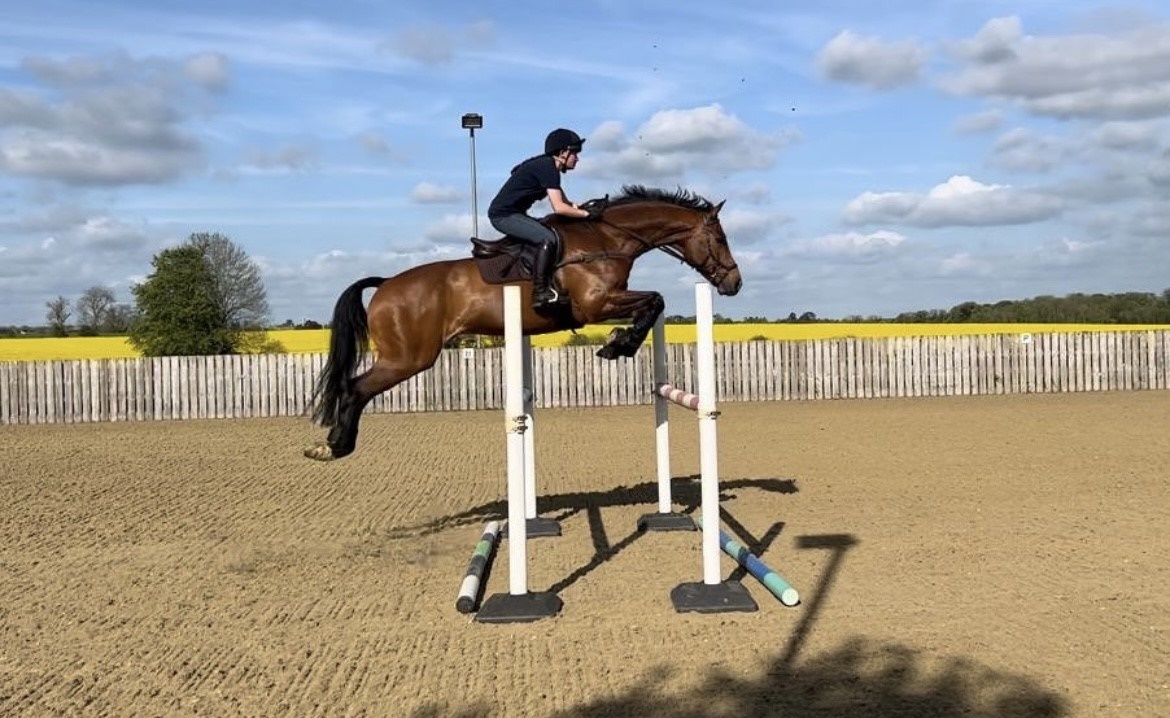BSc (Hons) Bloodstock and Equine Performance Management (Top-up)
This programme has been specifically designed for students who want to build on their existing qualifications, enabling them to access new career opportunities or enhance performance in their current workplace.
The equine industry in the UK is diverse and made up of many different sized businesses all of whom need graduates with a good knowledge of equine science and the equine industry, as well as core business skills. So you could find yourself working in sectors including horse racing and bloodstock production, the sport horse sector including the Olympic disciplines. Each of these areas of the equine industry are also served by a range of organisations providing goods and services ranging from event hospitality, animal health and welfare to animal feed and forage production.
So if you aspire to have a career in the Thoroughbred or sports horse industry, our specialist Bloodstock and Equine Performance Management degree will give you the knowledge and learning experiences to prepare for careers in training, breeding and sales, racecourse and event management, and racing administration.
Course overview
This top-up programme focuses on the themes of breeding, training, health and welfare for all performance horses. You will also study bloodstock industry specialist modules, which allow you to explore the unique nuances and challenges of this sector.
'"The programme equips students with the skills, knowledge, and adaptability needed to contribute meaningfully to the bloodstock industry"
Ed Bailey, Ed Bailey Bloodstock
Teaching on this programme includes a wide range of industry speakers representing both national and global organisations. This is combined with the latest research in equine science, to produce graduates who can take scientific advancements into industry practices and drive the future of equine performance management.
There will be plentiful industry visits and industry leading guest speakers allowing you to learn from the best there is. There will also be an optional study tour to Ireland to explore the Irish bloodstock industry as a comparison to the UK. This will incur an additional course supplement of £700 to cover the cost of the tour.
Course content
The research project is an integral part of the course and provides essential experience in both design and execution of a piece of research. You can choose to focus on either science or business and you could also see your Research Project featured in one of the many academic journals that regularly publish our students’ work.
Timetables
Please note that while we make every effort to ensure that timetables are as student-friendly as possible, scheduled teaching can take place on any day of the week. Wednesday afternoons are normally reserved for sports and societies activities.
Modules
Each module is worth a specified number of credits. Each credit equates to 10 hours of total study time. Total study time includes scheduled teaching, independent study and assessment activity.
To achieve the award of BSc (Hons) in Bloodstock and Equine Performance Management, a student must achieve a minimum of 120 credits. For this BSc (Hons) Top-up course, your grade is calculated entirely on this course's modules.
The modules available for this degree are shown below. They may change for your year of study as we regularly review our module offerings to ensure they’re informed by the latest research and teaching methods.
Year three
- 6M001 Research Project: This module enables students to undertake an independent research project aligned with their subject area. Topics are student-selected and supported through supervisor meetings and workshops. Assessment includes a 5-minute progress presentation and a 12,000-word thesis or multimedia portfolio. The module supports critical evaluation, ethical research design, and evidence-based recommendations for real-world challenges.
- 6Q002 Advances in Equine Training and Performance: This module examines contemporary training methods and technologies to optimise equine performance. Topics include biomechanics, welfare, tack innovations, and regulatory frameworks. Students engage with guest lectures, debates, and research analysis. Assessment includes a 1500-word article for a lay audience and a 2-hour seen exam. The module supports critical evaluation of training strategies and evidence-based approaches to equine athletic development.
- 6Q004 Equine Orthopaedics and Rehabilitation: This module explores equine orthopaedic disease, injury prevention, and rehabilitation. Topics include diagnostic imaging, discipline-specific injuries, physiotherapy, and treatment strategies. Students engage with case studies, lab sessions, and hospital visits. Assessment includes a 2500-word knowledge summary and a scientific poster presentation. The module supports critical evaluation of equine musculoskeletal health and evidence-based rehabilitation practices.
- 6Q005 The Global Bloodstock Industry: This module examines the structure, challenges, and opportunities within the global Thoroughbred breeding and racing sectors. Topics include international industry comparisons, welfare, economics, and emerging markets. Students engage with guest lectures, debates, and an optional study tour. Assessment includes a 2500-word racing series proposal and a 2500-word breeding industry review. The module supports critical evaluation of global bloodstock systems and strategic development planning.
- 6Q003 Breeding and Stud Management: This module investigates reproductive biology and stud farm operations across sport horse and bloodstock sectors. Topics include mare and stallion selection, assisted reproductive technologies, health management, and industry challenges. Students engage with field visits, guest lectures, and practical sessions. Assessment includes a 10-minute oral presentation and a 2-hour seen exam. The module supports critical evaluation of breeding strategies and sustainable stud management.
Disclaimer information
The University has established various rules and regulations that you must agree to and follow if you accept an offer to study with us. View our full disclaimer notice.
Careers and graduate destinations
Graduates are likely to pursue careers as:
- Bloodstock agent
- Stud manager
- Racecourse manager
- Trainer
- Racing administration
"I looked at the website and I just thought that this looks incredible, the alumni have gone on to do so many amazing things."
Florentyna Anderson, Graduate
Entry requirements
Typical offers
- A foundation degree or an HND award in a related subject, achieving 240 credits overall and gained in the last five years
- Depending on previous studies, you may be required to complete additional ‘bridging’ studies prior to enrolling on the Honours course in order to cover identified gaps in previous learning
Flexible entry
The University welcomes interest from applicants who may not have the standard entry requirements. A wide range of qualifications and experience are accepted in order to join University degree programmes. The University always considers evidence of personal, professional (APL) and educational experience, (APEL), which show an ability to meet the demands of their intended programme of study.
Further information
Read more general information about our entry requirements.
International students will also need to achieve IELTS Academic or equivalent at the appropriate level for your programme of study. English language requirements for international students.
For any further help, please contact our admissions team:
- Email: admissions@rau.ac.uk
- Telephone: +44 (0)1285 889912
Fees
2026-27 Applicants
For the academic year 2026-27 the tuition fees for this course are:
| UK | International | |
|---|---|---|
| Full-time | £9,790 per year | £16,950 per year |
For part-time study, please contact admissions@rau.ac.uk for further information.
Please also refer to the funding your time at university page.
Tuition fees may be subject to an inflationary increase each year as set out in our Access and Participation Plan and are subject to Government and regulatory body conditions.
If you are an Irish national you can check if you meet the requirements for Home Fees. Please visit the UKCISA website and consult the pdf guide “England HE – who pays Home Fees”. First check category ‘3 years in Republic of Ireland/UK/Islands, settled in UK’ or ‘Brexit temporary offer for courses starting before 2028: Irish citizens with residence in Europe or overseas territories’. You will possibly need to be fee assessed when you submit an application for study to the RAU.
Scholarships
The University offers a wide range of generous fee waivers and bursaries. To find out more about these, please visit the bursaries, awards and scholarships page.
Ready to take the plunge? Apply now
Applications should be made by the UCAS deadline to ensure we are able to offer you a place on your first choice course. However, if you have missed the deadline please contact Admissions@rau.ac.uk as there are usually places available.
If you would like to apply during UCAS Extra or Clearing, please check that we have places available.
Applicants wishing to study on a course on a part-time basis will need to apply directly to the RAU.
Please contact admissions@rau.ac.uk to discuss your requirements and obtain an application form.



